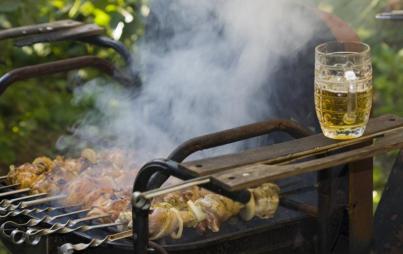
Beef: Yes or No?
The next morning, I thought, the ban is not really about beef, is it? It is about power and control.
We recently celebrated Diwali, the Festival of Lights. In India, where I come from, Hindus were cooking up a storm, visiting friends, celebrating the triumphant return of Rama (the hero of the ancient epic Ramayana) to his kingdom, the victory of good over evil. Ironically, a few days earlier, a Muslim man was brutally beaten to death for his transgression of eating beef.
What? How did we get to this point? How could I register my protest as a chef, a writer, and a mom?
India is known the world over for its vegetarianism and some states have prohibited cow slaughter and consumption for years. But such a ban seemed unthinkable in Maharashtra, where I come from (and where Mumbai is located), given its diverse and broad-minded population.
Then, the unthinkable happened last March.
Not only does the new law prohibit people from eating beef, but it also has repercussions for the state economy. Steak houses and burger joints that served beef are now without product, and the livelihood of butchers, vendors, and the leather industry has abruptly ceased. More troubling is the assumption that the ruling Hindu right wing government can dictate the freedoms of minorities, despite India being constitutionally secular. What happened to freedom of choice?
I live with my teenage daughter in California where choices abound. She was born and raised here, but I do try to keep her connected to her Indian heritage, so I invited friends — an assortment of American, Indian, and second generation Indian-American — to a Diwali party. Then I decided to throw in a twist. Festival food is traditionally vegetarian but I added beef to the menu!
Mahatma Gandhi once said, “Whatever you do will be insignificant, but it is very important that you do it.”
I was born in India but grew up in different places, surrounded by other cultures so I was raised an equal opportunity celebrator and eater! My parents observed every holiday they could. Mom made karanjis (coconut-filled pastries) and other delights for Diwali, semiya (traditional Muslim sweet vermicelli) for Eid, latkes for Hanukkah and eggnog for Christmas.
Food became a way to connect with my roots. It also eventually became my career. I researched food history and wrote two cookbooks on my native cuisine in English (Maharashtrian Cuisine: A Family Treasury; Bombay: Zaika 1999; The Essential Marathi Cookbook; New Delhi: Penguin India, 2009), making sure to include recipes from Maharashtra’s varied religious communities.
In his A Historical Dictionary of Indian Food; New Delhi: Oxford University Press, 1998, India’s pre-eminent food historian KT Achaya, writes that “most Hindus, Sikhs and Parsis in India today, even when they eat flesh, desist from eating beef," but in ancient India, meat was sacrificed for religious rituals, " ... after which the sanctified meat was eaten, included bovines ... ”
On Diwali, I stenciled pretty rangoli (rice powder patterns) on my front steps, lit up the house with tea lights and bought sparklers for the kids. As an appetizer, I served an Indian inflected guacamole with curry leaves, mustard, seed and green chilies, accompanying it with crispy khakra (flat Indian snack bread).
For dinner, there were stewed green mung beans with coconut and tamarind, Basmati pilaf, sautéed pumpkin with coriander and cumin seed, a tomato-onion raita, and savory cranberry chutney with star anise and cloves.
I pulled out the well-worn copy of the cookbook I wrote and contemplated Muslim and Christian meat recipes. And then I saw Malvani Mutton. A coastal Hindu dish, rich with ground coconut, coriander seed, onion, garlic and coconut milk, it was just what I wanted. But instead of the requisite mutton or lamb, I was going to use beef.
I bought it proudly because in California, I can!
I marinated the chunks in a ginger-garlic yogurt and braised them in a fragrant spice paste till they were fork-tender. At dinner, my guests raved, “It’s beyond good,” taking second and third helpings. After seeming aghast at my break in tradition (though I'm hardly ever traditional!), my daughter wanted to eat nothing else and asked for leftovers the next day.
The next morning, I thought, the ban is not really about beef, is it? It is about power and control.
And I remembered something else KT Achaya had said. “The Ramayana reflects the mores of Kshatriyas [warrior] nobility, and for a feast given by King Dasharatha, the father of Rama, ‘buffalo calves (were) roasted on spits, with ghee dripping on them.”
So this year as we celebrated Diwali, I discovered that by cooking beef, I had protested food injustice, true. But hadn't I also adhered to a well-documented and ancient Indian tradition?




